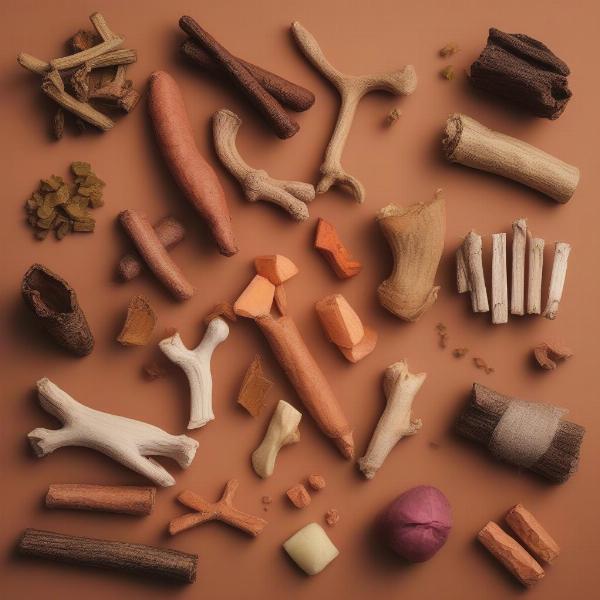Beef hide chews are a popular treat for dogs, offering a long-lasting chew to satisfy their natural instincts. But are they the right choice for your furry friend? This comprehensive guide delves into the benefits and risks of beef hide for dogs, helping you make an informed decision about whether or not to include them in your dog’s diet. We’ll explore everything from nutritional value and potential hazards to selection and safe chewing practices.
Understanding Beef Hide: What Is It Exactly?
Beef hide is the inner layer of cow skin that’s been cleaned, dried, and sometimes processed into various shapes and sizes for dogs to chew on. It’s a tough, durable chew that can keep dogs entertained for extended periods. However, the processing methods and potential additives can significantly impact a beef hide’s safety and suitability for your dog.
Benefits of Beef Hide Chews for Dogs
Beef hide offers several potential benefits for dogs, including dental health improvement and stress relief. The act of chewing can help scrape away plaque and tartar buildup, promoting healthier teeth and gums. The long-lasting chew also provides mental stimulation and can help alleviate boredom and anxiety, especially for dogs who are left alone for periods of time.
Potential Risks of Beef Hide for Dogs
Despite the benefits, beef hide chews come with certain risks. One primary concern is the potential for choking, especially with larger pieces or if a dog breaks off and swallows a large chunk. Digestive issues can also arise if a dog consumes too much beef hide, leading to blockages or stomach upset. Additionally, some beef hides are treated with chemicals during processing, which can be harmful if ingested.
Choosing the Right Beef Hide for Your Dog
Selecting a high-quality beef hide is crucial for minimizing risks. Look for hides that are minimally processed and free from artificial colors, flavors, and preservatives. Opt for hides made from grass-fed cattle whenever possible. Consider your dog’s size and chewing habits when choosing the size and shape of the hide. Small dogs should be given smaller, thinner hides to prevent choking, while larger dogs can handle thicker, more durable chews.
Safe Chewing Practices
Supervision is key when giving your dog a beef hide. Never leave your dog unattended with a chew, and always ensure they have access to fresh water. Discard any small pieces or fragments to prevent choking hazards. If the hide becomes too small or soft, replace it with a new one. Regularly inspect your dog’s teeth and gums for any signs of problems.
 Alternative dog chews made from natural ingredients like bully sticks, sweet potato, and antlers.
Alternative dog chews made from natural ingredients like bully sticks, sweet potato, and antlers.
Are Beef Hides Right for Your Dog?
Whether or not beef hide is suitable for your dog depends on individual factors such as size, chewing habits, and overall health. If you have any concerns, consult your veterinarian for personalized advice. They can help you assess the risks and benefits based on your dog’s specific needs. is beef hide ok for dogs and beefhide for dogs can provide further insights into this topic. You might also consider exploring alternative chews like tendon chews for dogs, good chews for dogs or even beef tendons for dogs for other healthy options.
Conclusion
Beef hide chews can be a satisfying treat for dogs, but they should be given with caution and careful consideration. By understanding the potential benefits and risks, choosing high-quality products, and practicing safe chewing habits, you can help ensure your dog enjoys their beef hide chew safely.
FAQ
- Are all beef hides created equal? No, the quality and processing of beef hides can vary significantly. Choose minimally processed hides from reputable sources.
- What should I do if my dog swallows a large piece of beef hide? Contact your veterinarian immediately as it could cause a blockage.
- Can puppies have beef hide chews? It’s best to wait until a puppy’s adult teeth have come in before introducing beef hide.
- Are there any alternatives to beef hide chews? Yes, there are many alternative chews available, such as bully sticks, antlers, and various dental chews.
- How often should I give my dog a beef hide chew? Beef hide should be given as an occasional treat, not a daily staple.
- Can beef hide chews upset a dog’s stomach? Yes, consuming too much beef hide can cause digestive upset or diarrhea.
- How do I know if a beef hide is too small for my dog? If your dog can swallow the hide whole or break off large chunks, it’s too small.
ILM Dog is your trusted resource for all things canine. We provide expert advice on dog breeds, health, training, nutrition, grooming, and much more. From puppy care to senior dog support, we’re here to help you every step of the way. Contact us today for personalized advice at [email protected] or +44 20-3965-8624. ILM Dog is dedicated to helping you provide the best possible care for your beloved companion.